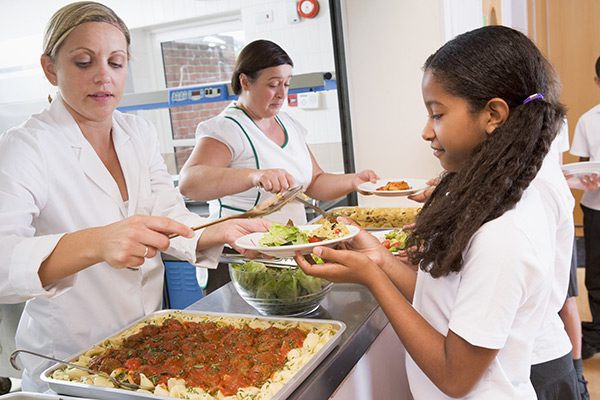One million children in poverty miss out on free school meals in the UK
Out of the 4 nations, Wales has highest proportion of children missing out
- Alarming number of children in poverty still don’t qualify for free school meals (FSMs), despite a rise in the number eligible during the pandemic
- Proportion of children in poverty not getting free school meals varies a lot across the 4 nations, and is highest in Wales and England (where 42% and 37% of children in poverty miss out on free meals respectively). Rates are much lower in Scotland (17%) and Northern Ireland (22%).
- Restrictive eligibility criteria and low provision of universal free school meals cause more children in poverty to miss out.
- Child Poverty Action Group and low-income parents participating in the Covid Realities project call for urgent action to extend free school meals to all households on universal credit or equivalent benefits.
- Report authors also call for the extension of FSM to families with no recourse to public funds, better support for family finances year-round through the social security system, and for progress towards universal provision of FSM for all children in the UK.
A new report from Child Poverty Action Group and Covid Realities shows that 36% (about 1 million) of all school-aged children in poverty in the UK are not entitled to a free meal at school. The analysis shows that despite a rise in the number of children claiming FSMs between March 2020 and March 2021, restrictive eligibility criteria still prevent many in poverty from accessing any form of free school meal provision.
Households on universal credit in England and Wales must earn less than £7,400 a year to be eligible for free school meals, regardless of the number of children in the family. In Scotland, they must earn less than £7,320, while in Northern Ireland, the threshold is higher at £14,000. These low limits on income mean that many children from working families are in poverty but unable to access free school meals.
While the majority of children in poverty who don’t qualify for free school meals are in England (due to its much larger population), all four nations have a concerning proportion of children in poverty missing out. In Wales, 42% (55,000) of children in poverty miss out; in England, 37% (900,000); in Scotland, 17% (25,000); and in Northern Ireland, 22% (20,000).
The report identifies three factors that affect the number of children in poverty in each nation who are ineligible for free school meals:
- The eligibility criteria for means-tested FSMs
- The provision of universal FSMs (e.g. for infants in England)
- The underlying child poverty rate in that nation
Low-income parents participating in the Covid Realities research project shared their experience of free school meals to inform the report, and helped to develop recommendations. All parents whose children receive FSMs said they value that provision highly, and said it made a “huge difference” to family life. Those whose children did not receive free school meals highlighted barriers to eligibility including being in receipt of working tax credit.
Child Poverty Action Group and Covid Realities participants are making an urgent call to extend means-tested FSMs to everyone on universal credit or equivalent benefits. CPAG estimates this would cost £700 million per year. In addition, FSM should be extended to all families with no recourse to public funds (NRPF).
The authors are also recommending a move towards universal free school meals for all children in the UK, stating the numerous benefits of this approach, including increased take-up and reduced stigma. CPAG estimates that universal free school meals for all children in the UK would cost £1.75 billion. As a smaller step towards that, they recommend following the Scottish government’s lead by extending universal free school meals to all primary school pupils in the rest of the UK. CPAG estimates this would cost £770 million per year.
Child Poverty Action Group and Covid Realities participants are also calling for better support for family finances throughout the year by addressing the inadequacy of the social security system. This would help families during pinch points like the holidays, when many families have to rely on support schemes to make ends meet. In the short term, the authors are calling for the planned £20 cut to universal credit to be abandoned.
Kate Anstey, UK Cost of the School Day lead at Child Poverty Action Group, said:
“It should be an outrage that so many children in poverty aren’t allowed a free school meal. We know what a huge difference these meals can make to struggling families who are at their wits’ end. It’s high time we gave them one less thing to worry about – that’s why we’re calling for urgent changes to the rules so all families on a low income can get this daily support.”
Dr Maddy Power, Co-Investigator of the Covid Realities project, said:
“Listening to parents and carers living on a low income it is evident the important difference that free school meals can make to family finances but also the hardship caused when families, despite living in poverty, miss out on this essential support. Parents and carers are clear that ultimately the only dignified and fair solution is universal free school meals for all children in the UK. In the short-term, however, change is needed urgently to ensure that all families living on a low income are entitled to free school meals.”
Emma, a Covid Realities participant, said:
“My son was entitled to free school meals as he was in the age bracket for it [to qualify for universal infant FSM in England]. Now he’s older he won’t be getting free school meals so that is extra expenses I need to find on top of a new school uniform and two other children also starting nursery for the first time. We won’t receive free school meals because of our income, yet we are classed as on a low income. It doesn’t make sense to me at all and it just adds that added expense on top of the £20 lifeline being taken away. I feel as though I’m being hit from both angles.”
Quotes from Covid Realities participants:
Barriers to FSM eligibility:
“We as a family would be better off not getting working tax credit as that stops us being entitled to free school meals, yet we pay over triple the amount we receive in working tax credit on school meals… really makes me wonder how many more people don’t get free school meals due to a tiny amount of working tax credits!” (Nova)
Parents valuing FSM:
“I think a lot of people think free school meals means that you’re not managing… all of our kids deserve the same start and so they [free school meals] make a big big difference to us.” (Lois)
Stigma of claiming FSM:
“I do not currently receive free school meals for my daughter, although I believe I would be entitled to this as I am a single parent in receipt of ESA due to severe mental health issues, mainly due to being embarrassed and the stigma involved for her at school.” (Erik)
Help keep news FREE for our readers
Supporting your local community newspaper/online news outlet is crucial now more than ever. If you believe in independent journalism, then consider making a valuable contribution by making a one-time or monthly donation. We operate in rural areas where providing unbiased news can be challenging. Read More About Supporting The West Wales Chronicle



























